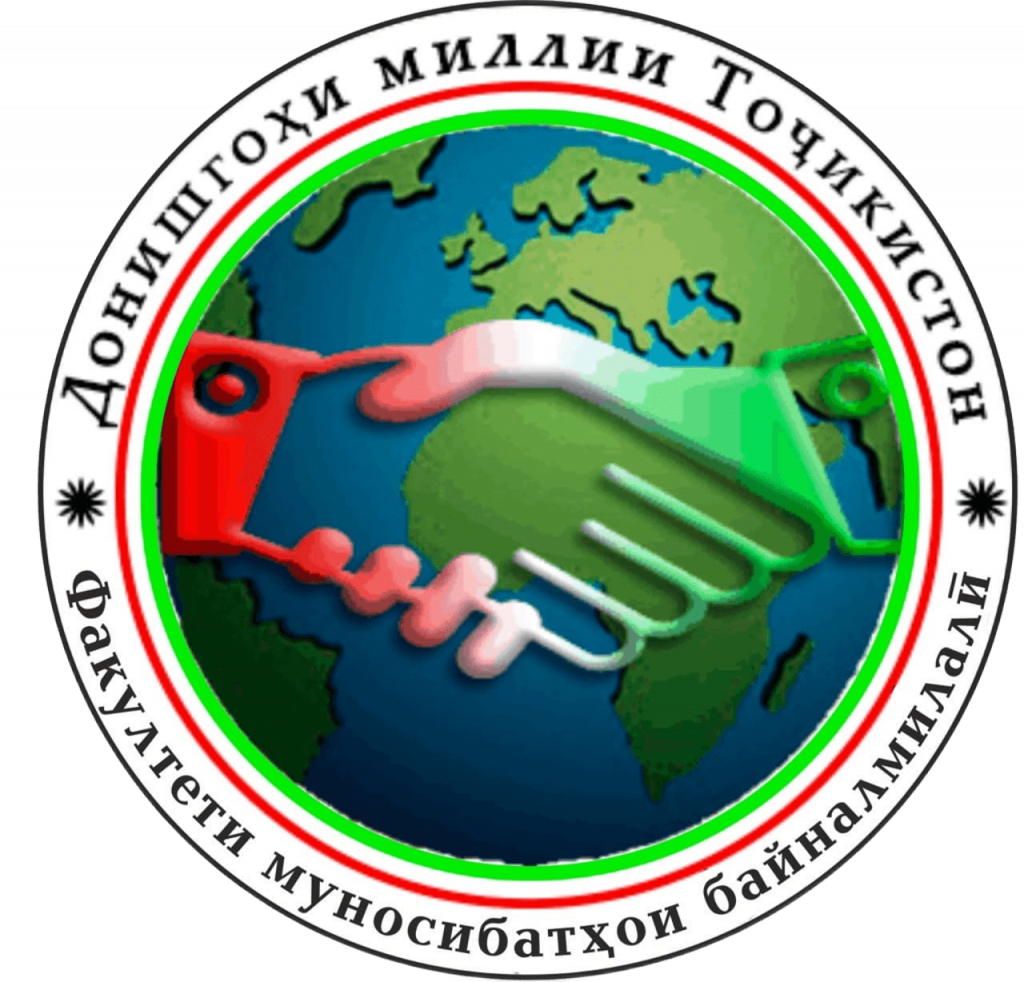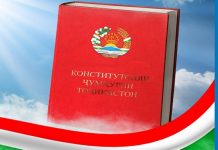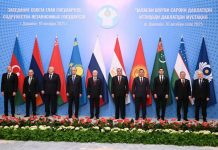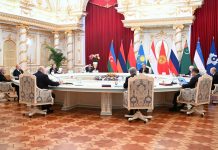The Republic of Tajikistan and the Founder of Peace and National Unity – Leader of the Nation, President of the Republic of Tajikistan, Honorable Emomali Rahmon, are striving to attract the attention of the world community to solving water issues based on international cooperation. The main components of the international water policy of Tajikistan are the country’s global water initiatives, which were adopted by the UN and countries of the world. The first international initiative of Tajikistan was the declaration of 2003 as the “International Year of Freshwater” (UN General Assembly Resolution of December 20, 2000, 55/196, 55th session), which was implemented with the support of the UN and other countries of the world. Naturally, the most pressing problem is the problem of lack of drinking water, which is a matter of life and death. To solve this problem, first of all, we need full-scale and comprehensive cooperation, as well as mutual support from the world community. This is why Tajikistan continues its international action to solve this problem. At the initiative of Tajikistan and with the support of the UN and countries of the world, 2005-2015 was declared the International Decade for Action “Water for Life” (UN General Assembly Resolution of 23 December 2003, 58/217, 58th session). On the basis of this Decade, the actual action of the world community was strengthened to fulfill all tasks related to improving water supply and access to clean drinking water. The goal was set to partially reduce by 2015 the proportion of people without access to drinking water and sanitation.
As part of this initiative, with the assistance of the UN and other international organizations, the following major international water events were held in the city of Dushanbe:
- International conference on regional cooperation in transboundary river basins. May 30-June 1, 2005
- International Conference on Water-Related Disaster Reduction. June 27-29, 2008
- High-level International Conference on the Midterm Borderless Review of the Implementation of the International Decade for Action “Water for Life”, 2005-2015. June 8-10, 2010
As stated above, water diplomacy is a major deciding factor. Only through joint efforts can we achieve the expected results. Effective relationship between the countries of the world, together with world organizations and institutions, to implement the assigned tasks and goals is considered the key to reducing the rate of the water crisis. Taking into account the growing water problems and recognizing cooperation as a key factor in their solution, the UN General Assembly, at the initiative of the Republic of Tajikistan, adopted resolution 65/154, adopted by consensus on December 20, 2010. Resolution adopted by the General Assembly International Year of Freshwater, 2003 The General Assembly, Recalling the provisions of Agenda 21, the Program of Action for the Further Implementation of Agenda 21 adopted at its nineteenth special session, and the freshwater decisions of the Economic and Social Council and the Commission on Sustainable Development, adopted at its sixth session, recalling also Economic and Social Council resolution 1980/67 of 25 July 1980 on international years and anniversaries, in which the Council recognized the contribution that the celebration of international years can make to development international cooperation and understanding, further recalling its resolution 53/199 of 15 December 1998 on the proclamation of international years, noting ongoing work in the United Nations system, as well as the work of other intergovernmental organizations related to freshwater resources:
proclaims 2003 the International Year of Freshwater;
Invites the Subcommittee on Water Resources of the Administrative Committee on Coordination to act as the coordinating body for the Year and to prepare appropriate initial proposals for consideration by the General Assembly at its fifty-sixth session regarding possible activities that could be carried out at all levels, as appropriate, including possible sources of funding;
Calls upon Member States, national and international organizations, major groups and the private sector to make voluntary contributions in accordance with the guidelines for international years and anniversaries;
Encourages all Member States, the United Nations system and all other stakeholders to use the Year to raise awareness of the importance of freshwater and promote activities at the local, national, regional and international levels;
Requests the Secretary-General to report to the General Assembly at its fifty-seventh session on progress made in preparations for the International Year of Freshwater.
Resolution adopted by the General Assembly on 23 December 2003 International Decade for Action “Water for Life”, 2005-2015 The General Assembly, Recalling its resolution 55/196 of 20 December 2000, in which it proclaimed 2003 as the International Year of Freshwater, emphasizing that water resources are critical to sustainable development, including environmental integrity and the eradication of poverty and hunger, and are absolutely essential to the health and well-being of people, recalling the provisions of Agenda 21, the Program of Action for the Further Implementation of Agenda 21, adopted at its nineteenth special session, the Plan of Implementation of the World Summit on Sustainable Development (“Johannesburg Plan of Implementation”) and the decisions of the Economic and Social Council and the Commission on Sustainable Development at its sixth session relating to freshwater, reaffirming those agreed upon international development goals for water supply and sanitation, including those set out in the United Nations Millennium Declaration, and with a strong commitment to achieving the goal of halving by 2015 the proportion of people without access to safe drinking water, including from – lack of funds, and the similar goal set in the Johannesburg Plan of Implementation to halve the proportion of the population without access to basic sanitation services, taking note of the “United Nations World Water Development Report: Water for People, Water for Life”, a joint project of 23 specialized agencies and other organizations of the United Nations system, as well as other cooperation mechanisms and initiatives related to water, taking note also The Ministerial Declaration entitled “Message from the Lake and the Yodo River Basin”, adopted on 23 March 2003 at the Ministerial Conference on the occasion of the Third World Water Forum, held in Kyoto, Japan, and the Call of the Dushanbe Freshwater Forum, adopted September 1, 2003 at the International Freshwater Forum, held in Dushanbe on August 29–September 1, 2003:
proclaims the period 2005–2015, initiating International Water Day on 22 March 2005, as the International Decade for Action “Water for Life”;
Decides that the objectives of the Decade should be to emphasize water-related issues at all levels and implement water-related programs and projects, with an emphasis on ensuring the participation and inclusion of women in water-related aspects of development activities, and to further develop international cooperation at all levels to contribute to the achievement of the internationally agreed water goals set out in Agenda 21 and the Program of Action for the Further Implementation of Agenda 21, the United Nations Millennium Declaration5 and the Johannesburg Plan implementation of decisions3 and, as appropriate, goals agreed upon at the twelfth and thirteenth sessions of the Commission on Sustainable Development;
Decides that the objectives of the Decade should be to emphasize water-related issues at all levels and implement water-related programs and projects, with an emphasis on ensuring the participation and inclusion of women in water-related aspects of development activities, and to further develop international cooperation at all levels to contribute to the achievement of the internationally agreed water goals set out in Agenda 21 and the Program of Action for the Further Implementation of Agenda 21, the United Nations Millennium Declaration, and the Johannesburg the implementation plan and, as appropriate, the goals agreed upon at the twelfth and thirteenth sessions of the Commission on Sustainable Development;
3. Welcomes the decision taken by the Commission on Sustainable Development at its eleventh session to adopt, as indicated in its multi-year program of work, water, sanitation and human settlements as a thematic cluster for the first cycle 2004–2005, and invites the Commission, within available resources to outline possible activities and programs in connection with the Decade as part of its consideration at its twelfth and thirteenth sessions of the thematic cluster of water, sanitation and human settlements, as contained in its multi-year program of work;
4. Invites the Secretary-General to take appropriate measures to organize the activities of the Decade, taking into account the results of the International Year of Freshwater and the work of the Commission on Sustainable Development at its twelfth and thirteenth sessions;
5. Calls upon the relevant United Nations bodies, specialized agencies, regional commissions and other organizations of the United Nations system to undertake a concerted response, using available resources and voluntary contributions, to ensure that the Water for Life Decade truly becomes a decade of action.
Speaking with international initiatives, Tajikistan put forward the thesis that, since water resources are formed in the territory of some Central Asian countries, and most of the water consumption occurs in others, it is necessary to develop a comprehensive regional strategy for their use.
This formulation of the issue is reflected in the UN Report “Water and Sustainable Development of the World”: “…the constantly growing pressure on water resources can lead to increased competition not only between different sectors of the economy, but also between regions and countries.” In this regard, the authors of the Report point out defects in the water use system and note the need to change methods of management, assessment and use of water resources. Water is often grossly underpriced, meaning water costs are rarely considered in energy and industrial decision-making. Typically, decisions that largely determine water use are in the hands of a limited number of individuals and institutions (public, semi-public and private) and are made based on short-term considerations, without taking into account environmental aspects[2].
Tajikistan’s international initiatives related to “water diplomacy” include:
- declaration of 2003 as the International Year of Freshwater. On October 1, 1999, at the 54th session of the UN General Assembly, the President of the Republic of Tajikistan came up with this initiative, which on September 20, 2000, at the 55th session of the UN General Assembly, was supported by a resolution declaring 2003 the Year of Freshwater. On August 29 – September 1, 2003, the International Freshwater Forum was held in Dushanbe;
- declaration of 2005-2015 as the International Decade for Action “Water for Life”. In accordance with the Dushanbe Declaration of December 23, 2003, the General Assembly adopted a corresponding resolution (UNGA Resolution of December 23, 2003, 58/217, 58th session), declaring 2005-2015 the International Decade for Action “Water for Life” ;
- the initiative to create an International Consortium for the use of Lake Sarez water to provide fresh water to the countries of Central Asia;
- the initiative to create an International Fund for the Protection of Glaciers, which was announced in Geneva at the third Global Environment Forum (August 31 – September 4, 2009) and in Copenhagen at the 15th Conference of Supporters of the UN Framework Convention on Climate Change (7- December 8, 2009);
- the initiative to declare 2012 the International Year of Water Diplomacy to strengthen cooperation in resolving relations in the field of rational use of water resources;
- declaration of 2013 as the International Year of Water Cooperation (UNGA Resolution of December 20, 2010, 65/154, 65th session). In accordance with this initiative, on August 20-21, 2013, a high-level international conference on water cooperation was held in Dushanbe, which was attended by more than 900 people, representatives of 70 UN member countries and 20 international organizations, including deputy secretaries general UN, Chairman of the UN General Assembly, Director General of UNESCO. Efforts to achieve the Millennium Development Goals and recommendations for further action beyond 2015 were discussed, including the development of water-related Sustainable Development Goals;
- proposal to hold a high-level international conference on the implementation of the International Decade of Action “Water for Life” (2005-2015) in Dushanbe on June 9-11, 2015. This proposal was supported by the UN General Assembly, which on December 19, 2014 adopted resolution A/RES/69/215 entitled “International Decade for Action on Water for Life, 2005-2015, and further efforts to achieve sustainable development of water resources” “
The resolution called on member countries, UN institutions, including UN-Water and other organizations to conduct a comprehensive assessment of the implementation of the International Decade and continue to take action to achieve internationally agreed goals on water;
- in development of this initiative and in order to build the capacity accumulated during the Decade of Action “Water for Life”, the President of Tajikistan E. Rahmon at the World Water Forum held in South Korea in mid-April 2015 proposed to declare an International Decade under the slogan “Water” for sustainable development”: “Current global challenges and threats, including population growth, climate change, increased frequency of natural hydrometeorological events, water shortages and low quality, which significantly affect poverty levels, increased infectious diseases, child and maternal mortality, still require mobilization our efforts and taking appropriate measures” [4];
- an initiative to consider the problem of ensuring water security in the medium and long term in the context of achieving the Sustainable Development Goals (ensuring the availability and rational use of water resources and sanitation for all; ensuring access to affordable, reliable, sustainable and modern energy sources for all; adopting urgent measures to combat climate change and its consequences). The Declaration of the High-Level International Conference on the Implementation of the International Decade for Action “Water for Life” (Dushanbe Declaration, June 2015) called on member states and other stakeholders to promote green development issues, take measures to achieve resilience to the impacts of global challenges, increase financing and improve governance, strengthen water cooperation, especially at the transboundary level, and take other concrete steps to address growing water problems [1].
As the initiator of the “water” resolutions of the UN General Assembly, Tajikistan actively promotes water issues on the global agenda, and in this context, through the efforts of the government, with the assistance of the UN and other international organizations, the following major international “water” events were held in Dushanbe:
– International Freshwater Forum (29 August – 1 September 2003);
– International Conference on Regional Cooperation in Transboundary River Basins (May 30 – June 1, 2005);
– International Conference on Reducing Water-Related Natural Disasters (27-29 June 2008);
– High-level International Conference on the Midterm Comprehensive Review of the Implementation of the International Decade for Action “Water for Life”, 2005-2015. (June 8-10, 2010);
– Preparatory conference “Towards the UN Conference on Sustainable Development (Rio+20): issues of cooperation on water resources” (October 19-20, 2011);
– High-level International Conference on Water Cooperation (August 27-29, 2013);
– High-level international conference on the implementation of the International Decade for Action “Water for Life”, 2005-2015. (June 9-11, 2015).
Water diplomacy proposed by Tajikistan is the intention to peacefully resolve problems associated with the management and use of water resources of transnational rivers in a region that includes not only post-Soviet states, but also Afghanistan, on whose territory the waterways flowing into the Amu Darya and the Aral Sea originate.
Thus, for the Republic of Tajikistan, the focus of its diplomacy is the prevention of threats associated with regional instability, irrational water use, cross-border crime, international terrorism and extremism, corruption, illicit drug trafficking, and ensuring food security. Modern realities suggest that Tajikistan will be an active functionary of water and energy diplomacy in the region.
Mirzoev Habibjon – candidate of historical sciences, senior lecturer of the department of international relations.




